Author Archives: Eleanor J. Bader
February 22, 2018 by Eleanor J. Bader
Meet a “Tomato Rabbi” Fasting Against Sexual Harassment
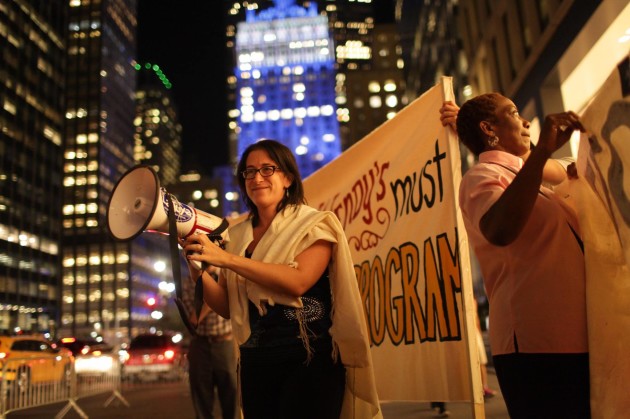
Rabbi Rachel Kahn-Troster holds a megaphone while protesting Wendy’s.
Six-and- a-half years ago, in fall 2011, a group of 17 rabbis traveled to Immokalee, Florida, to meet with the women and men who work in the area’s tomato fields and hear, first-hand, about their ongoing campaign to win justice and respect from the growers who employ them. Since then, 10 delegations—of rabbis, cantors, and lay religious leaders—have visited Immokalee. The trips were sponsored by T’ruah: The Rabbinic Call for Human Rights and participants have become staunch supporters of efforts by the Coalition of Immokalee Workers’ to improve wages and end the sexual exploitation and harassment of female farmworkers.
Rabbi Rachel Kahn-Troster, Director of Programs at T’ruah and a longtime supporter of the CIW, spoke to Eleanor J. Bader about the Coalition’s upcoming “Freedom Fast;” her decision to participate in the five-day, liquids-only, hunger strike; and the Jewish imperative to support human rights.
- No Comments
February 21, 2018 by Eleanor J. Bader
Why Dozens Are Fasting To Get Wendy’s To Address Sexual Harassment
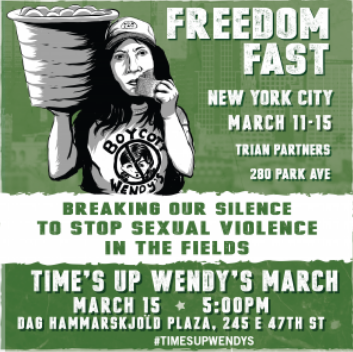 From March 11th to 15th, Lupe Gonzalo, a leader of the Coalition of Immokalee Workers, will be on a liquids-only “Freedom Fast.” The goal? To pressure Wendy’s, the only major fast food restaurant chain to refuse to adopt regulations to protect farmworkers from sexual harassment, wage theft, and other unfair labor practices in the tomato fields of southwest Florida. Gonzalo will be joined by dozens of workers and their families, as well as allies from diverse religious and secular communities, all of them united in demanding respect for the workers who plant our crops and harvest our fruits and vegetables.
From March 11th to 15th, Lupe Gonzalo, a leader of the Coalition of Immokalee Workers, will be on a liquids-only “Freedom Fast.” The goal? To pressure Wendy’s, the only major fast food restaurant chain to refuse to adopt regulations to protect farmworkers from sexual harassment, wage theft, and other unfair labor practices in the tomato fields of southwest Florida. Gonzalo will be joined by dozens of workers and their families, as well as allies from diverse religious and secular communities, all of them united in demanding respect for the workers who plant our crops and harvest our fruits and vegetables.
The protest will take place at the Park Avenue office of Nelson Peltz, Wendy’s board chair and a founding partner of Trian Fund Management, a New York City-based investment fund. According to Forbes Magazine, the 74-year-old Peltz has a net worth of $1.51 billion; in addition to Wendy’s, he is at present on the boards of Proctor & Gamble, the Simon Wiesenthal Center, and Sysco Systems.
To date, he has refused to negotiate with—or even meet—members of the CIW or supporters of the organization.
Gonzalo recently spoke with Eleanor J. Bader about the CIW, the upcoming hunger strike, and the progress that has been made since the Coalition was founded in 1993.
Patricia Cipollitti, National Co-coordinator of the Alliance for Fair Food, a consumer group, provided Spanish-to-English translation for the 90-minute interview.
- No Comments
December 26, 2017 by Eleanor J. Bader
Meet the Jewish Lesbian Feminist Who Goes Undercover to Report on the Alt-Right
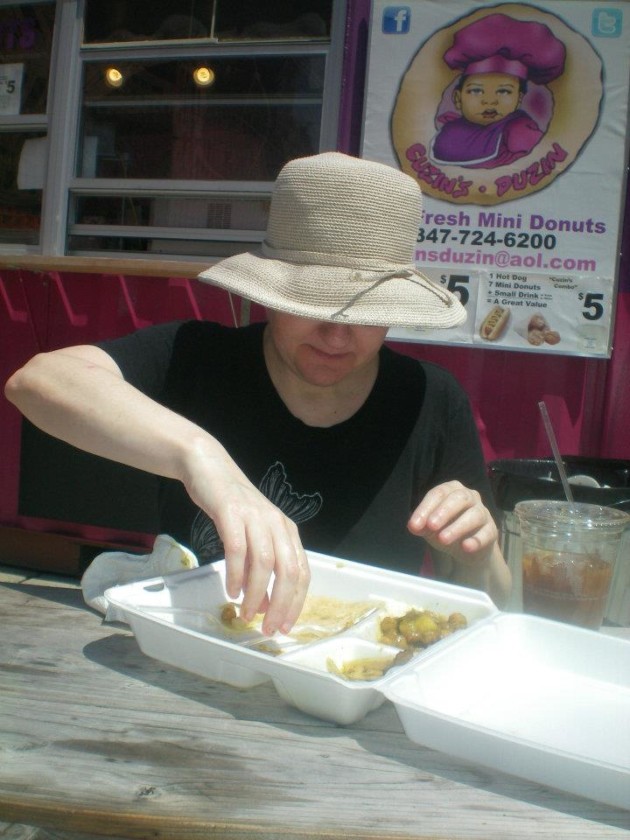
When award-winning journalist Donna Minkowitz (author of Ferocious Romance: What My Encounters with the Right Taught Me about Sex, God and Fury and Growing up Golem: How I Survived My Mother, Brooklyn and Some Really Bad Dates) attended a conference sponsored by the innocuously-named American Renaissance organization last summer, she knew she would be rubbing elbows with leaders of the alt-right. The three-day confab, held a few weeks before the Charlottesville Unite the Right rally, took place in a Tennessee state park and drew approximately 300 people, 90 percent of them male and all of them white.
Minkowitz, a self-described “secular, Jewish, lesbian feminist and leftist,” told Eleanor J. Bader about covering the event for Political Research Associates, an independently-funded social justice think tank based in Somerville, Massachusetts. She also spoke about her earlier interactions with conservative organizations.
- 3 Comments
November 27, 2017 by Eleanor J. Bader
Changing the Lives of Women in Prison: An Interview with Merle Hoffman
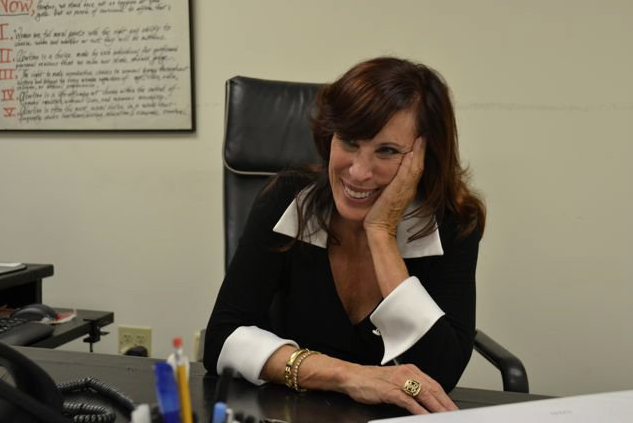
A photo of Merle Hoffman, founder and CEO of the Choices Women’s Medical Center. Photo credit: Vanessa Valenti
When the Rose M. Singer Center opened on New York City’s Rikers Island in 1988, it was touted as a “state of the art” facility where women prisoners would get training in the culinary arts, horticulture and sewing. According to the Center’s official history, the new center was expected to provide the correction facility’s staff with a chance to implement innovative programs—with an emphasis on vocational skill-building—that would lead to jobs when the women were released. In addition, the Center boasted of creating the nation’s first jail-based nursery, where new mothers and their babies could spend time together.
Fast-forward three decades. While the nursery remains open, few other innovations remain. In fact, many of the 800-plus women housed in the medium security prison have multiple gripes—from the food, to the boredom they experience, to the lack of access to medical and mental-health care.
Merle Hoffman, founder and CEO of the Choices Women’s Medical Center, heard these complaints and, with several clinic staff, recently went into the prison and met with some of the women who are incarcerated there.
She spoke with Eleanor J. Bader about what they found, and what they hope to do to ameliorate these difficulties.
- No Comments
October 26, 2017 by Eleanor J. Bader
America’s Home Care Crisis—And the Filmmaker Trying to Change It
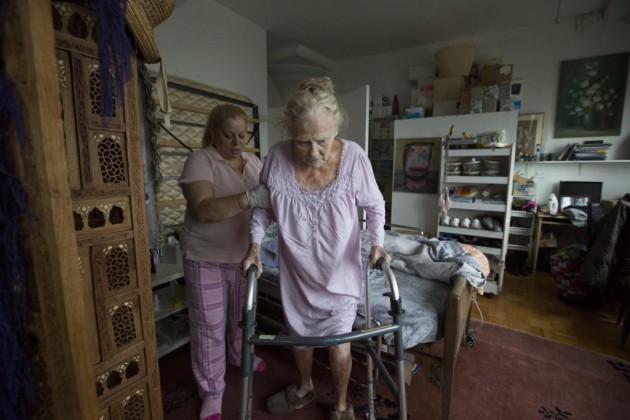 When Deirdre Fishel—director of CARE, a highly-lauded documentary about the growing home care crisis in the United States—was an undergraduate at Brown, she saw a film called We Will Not Be Moved. The movie addressed gentrification in Cincinnati, Ohio, and as she watched the footage, Fishel says that she became enraged that developers wanted to displace long-term residents to make way for the construction of high-end housing. In short order, Fishel found an internship in Cincinnati and spent a semester renovating housing for low-income people.
When Deirdre Fishel—director of CARE, a highly-lauded documentary about the growing home care crisis in the United States—was an undergraduate at Brown, she saw a film called We Will Not Be Moved. The movie addressed gentrification in Cincinnati, Ohio, and as she watched the footage, Fishel says that she became enraged that developers wanted to displace long-term residents to make way for the construction of high-end housing. In short order, Fishel found an internship in Cincinnati and spent a semester renovating housing for low-income people.
It was 1982 and serendipitously, she says, she met Tony Heriza, the filmmaker who directed We Will Not Be Moved. “He became my mentor,” Fishel told Lilith reporter Eleanor J. Bader. “We’ve had a long history together and thanks to him, I became dedicated to using film as an organizing tool.” Heriza was the producer of CARE, Fishel’s fourth film. (Earlier works include Risk; Still Doing It: The Intimate Lives of Women Over 65; and Sperm Donor X.)
Fishel and Bader recently spoke in Fishel’s light-filled Brooklyn kitchen.
- No Comments
October 25, 2017 by Eleanor J. Bader
Bhopal Dance: The 2017 Novel With Political Lessons from a 1984 Catastrophe
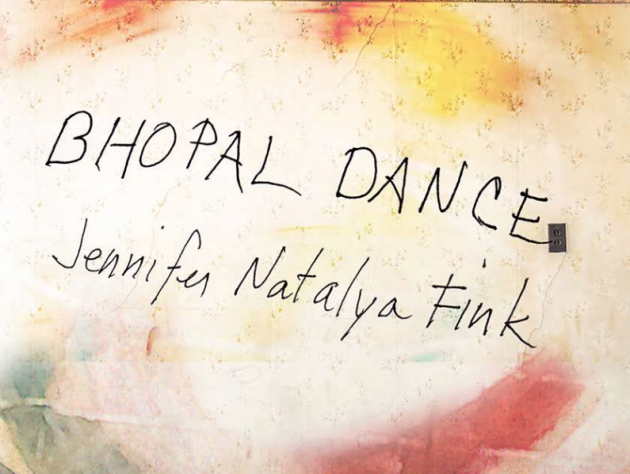 When Jennifer Natalya Fink was in her first semester of college, she says that two events made her feel as if the end of the world was imminent. The first was the November, 1984, re-election of Ronald Reagan. The second was an explosion of a Union Carbide pesticide plant in Bhopal, India, that began on December 2 that year, and spewed 30 tons of the highly-toxic gas methyl isocyanate into the air. Thirty-three years later, Bhopal remains the worst industrial disaster in world history.
When Jennifer Natalya Fink was in her first semester of college, she says that two events made her feel as if the end of the world was imminent. The first was the November, 1984, re-election of Ronald Reagan. The second was an explosion of a Union Carbide pesticide plant in Bhopal, India, that began on December 2 that year, and spewed 30 tons of the highly-toxic gas methyl isocyanate into the air. Thirty-three years later, Bhopal remains the worst industrial disaster in world history.
Fink’s latest novel, Bhopal Dance, explores this environmental calamity through the eyes of three young North Americans, one man and two women, who want to see Union Carbide prosecuted for poisoning thousands. The three are intimately involved—as lovers and as political comrades—and their strategic plan to avenge the deaths can be seen as both a call to arms and a cautionary tale. Winner of the 2017 Catherine Doctorow Innovative Fiction Prize by FC2/University of Alabama Press, Bhopal Dance will be released in March 2018.
Fink recently met with Eleanor J., Bader to discuss the book, her fourth. (Her other books include BURN, V, and The Mikvah Queen, which won the Dana Award and was nominated for both a National Jewish Book Award and the Pulitzer Prize.) Over tea, coffee, and bagels, their conversation touched on a wide range of topics: The ongoing need for non-violent activism to promote social justice, living as a secular Jew, and juggling writing, parenting, and teaching.
- No Comments
October 3, 2017 by Eleanor J. Bader
Improving the Lives of Ethiopian Women with Fistula: An Interview with Dr. Gladstone
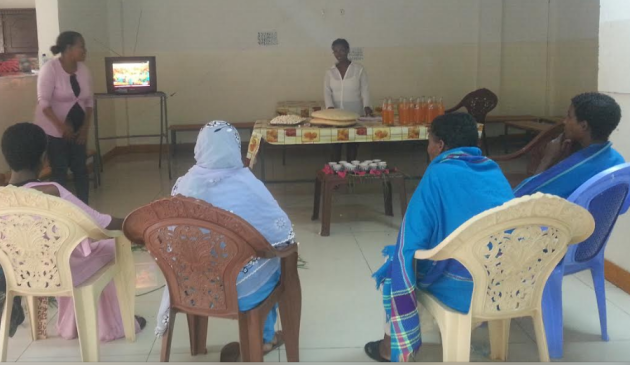
One of the nurses and the fistula patients in her group, taken at the final group meeting, which is a celebration. Photo courtesy of Dr. Gladstone.
When Dr. Tracy R.G. Gladstone visited Ethiopia’s Gondar Fistula Center in 2015, her goal was to train medical providers to address depression and anxiety in women with obstetric fistula: a hole in the tissues that separate a woman’s vagina, bladder and rectum. Fistula develop during obstructed childbirth when a timely caesarian section is not performed.
“Over the past several years I’ve seen growing recognition of obstetric fistula as a medical issue—non-Governmental Organizations (NGOs) have begun bringing mobile health units into rural areas to provide free repair surgery to women who need it—but not as much attention has been paid to pre- or post- surgical psychological health,” Gladstone, Associate Director and Senior Research scientist at the Wellesley Centers for Women, told Lilith.
Nonetheless, as the connection between physical and emotional health is better understood, Ethiopian medical workers have become increasingly receptive to learning concrete strategies to help women deal with their post-traumatic stress and other psychological problems the condition triggers.
That said, obstetric fistula remains a serious problem throughout much of sub-Saharan Africa and Asia, though it is almost never seen in North America. It is estimated that 39,000 Ethiopian women suffer from fistula. According to The Fistula Foundation, the country has just one physician per 10,000 people. What’s more, 41 percent of Ethiopian women are illiterate and female life expectancy is 67.4 years.
Gladstone became interested in the psychological issues surrounding fistula in 2010, after her pre-teen daughter, Sarah, read Sheryl WuDunn and Nichola Kristof’s book, Half the Sky. Sarah, Tracy Gladstone reports, was so incensed by what she’d read that she decided to raise money for fistula repair as a Bat Mitzvah project. Since then, Sarah has raised more than $10,000 for the effort.
In tandem with Sarah, Tracy Gladstone has created the COFFEE Project: Cognitive Behavioral Therapy with Obstetric Fistula for Education and Empowerment. She recently spoke to Eleanor J. Bader about her work.
- No Comments
August 2, 2017 by Eleanor J. Bader
Meet Bryna Wasserman: The Award-Winning Director Revitalizing Yiddish Theatre
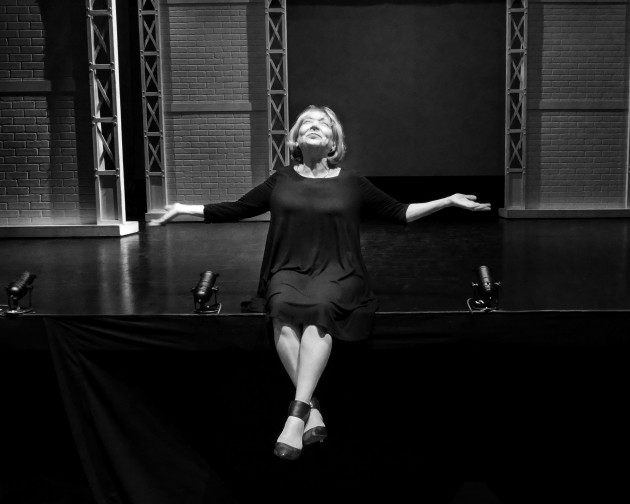
Photo credit: Joan Roth
When award-winning theatre director Bryna Wasserman—her accolades include the 2000 Montreal English Critics Circle Award of Distinction, the 2010 Mlotek Prize for Yiddish and Yiddish Culture, and the 2011 Quebec Drama Federation Award “in recognition of immense contributions to and support of the development of theatre in Quebec”— took the helm of the New York City-based National Yiddish Theatre Folksbiene (NYTF) in 2011, she had three goals.
The first was to find NYTF a permanent home. “We’d been wandering Jews for a century, going from one theatre to another,” she says. “There was an urgent need to change this.” The second goal was financial: to put the non-profit NYTF on solid footing. Lastly, she wanted the company’s 2015 centennial to foster a contemporary appreciation of Yiddishkeit.
All of this, of course, had to be done while making sure that the theatre staged at least one annual production and brought performances to diverse communities throughout, and beyond, the five boroughs of New York City.
Wasserman sat down with Eleanor J. Bader to discuss the overall state of Yiddish theatre and the ups-and-downs of running the NYTF. Along the way, the conversation touched on the plight of immigrants under Trump and the challenges facing all non-profit theatres.
- No Comments
July 4, 2017 by Eleanor J. Bader
The Anthology Giving Voice to the Labor of Caregivers
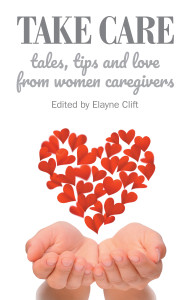 The numbers are mind-boggling: According to a 2015 report issued by the National Alliance for Caregiving and AARP, 39.8 million Americans—the lion’s share of them female—are providing unpaid care for someone aged 50 or older. Another two million people—again, most of them women—work as paid in-home health aides, administering medication, cooking, shopping, and providing oversight and companionship for adults needing assistance.
The numbers are mind-boggling: According to a 2015 report issued by the National Alliance for Caregiving and AARP, 39.8 million Americans—the lion’s share of them female—are providing unpaid care for someone aged 50 or older. Another two million people—again, most of them women—work as paid in-home health aides, administering medication, cooking, shopping, and providing oversight and companionship for adults needing assistance.
Writer Elayne Clift’s latest anthology, Take Care: tales, tips and love from women caregivers (June 2017, braughlerbooks.com) provides a forum for caregivers to address what it means for them—as daughters, daughters-in-law, nieces, friends, wives, or grandchildren—to tend to elders and the sick. For most, it’s a labor of love, and as they outline both the joys and hardships of providing care, they are, for the most part, the epitome of grace under pressure. But that’s not to say that the job is easy.
Take Care is a slim volume—28 brief essays and poems—and while it touches numerous aspects of caregiving, it is not comprehensive. Instead, it movingly zeroes in on what it means to be there for someone else, whether for the long haul or for a shorter stint. Harvard professor Paula J. Caplan, calls the collection “a sorely needed jewel that helps and heals.”
Clift spoke to Eleanor J. Bader by telephone a few weeks ago, from her Vermont home.
- 3 Comments
June 15, 2017 by Eleanor J. Bader
Creating Art for Our “Dire Times”
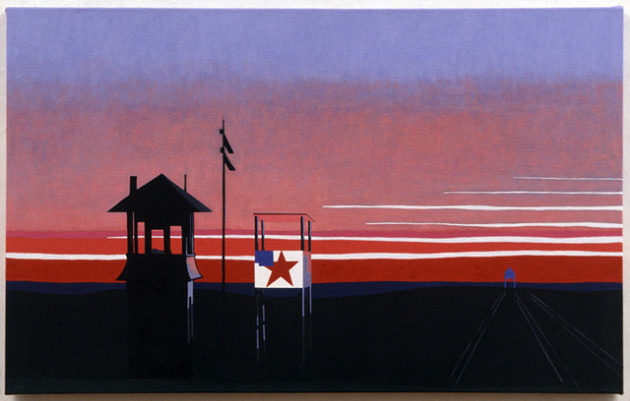
Dusk, Railroad – 2008 – 30 x 48 – Oil: Canvas
Like many of us, artist Marcia Annenberg is worried. First, there’s climate change. Then there’s the growing erosion of U.S. democracy—including the loss of many long-held civil liberties—and the tendency of mainstream media to replace hard news with entertainment and fluff.
“We’re in dire times,” the Manhattan-based Annenberg begins. “It’s frightening. The only consolation is that the American system of government was developed to protect us from efforts to subvert our institutions in negative ways.”
Annenberg’s work—color-driven abstracts and installations and paintings meant to jolt the viewer’s political awareness—are in numerous permanent collections: The London Jewish Museum; the Vad Yashem Art Museum in Jerusalem; the Vilna Gaon Jewish State Museum in Lithuania; and the Florida Holocaust Museum, among them. In New York City, she is represented by the Flomenhaft Gallery, one of Chelsea’s most respected women-owned exhibition spaces.
Annenberg sat down with Eleanor J. Bader on a blisteringly hot June morning. Surprisingly, despite the heavy subject matter, the pair found a great deal to laugh about as they discussed what it means to call oneself a progressive, humanist, activist-artist at this particular moment.
- No Comments
 Please wait...
Please wait...